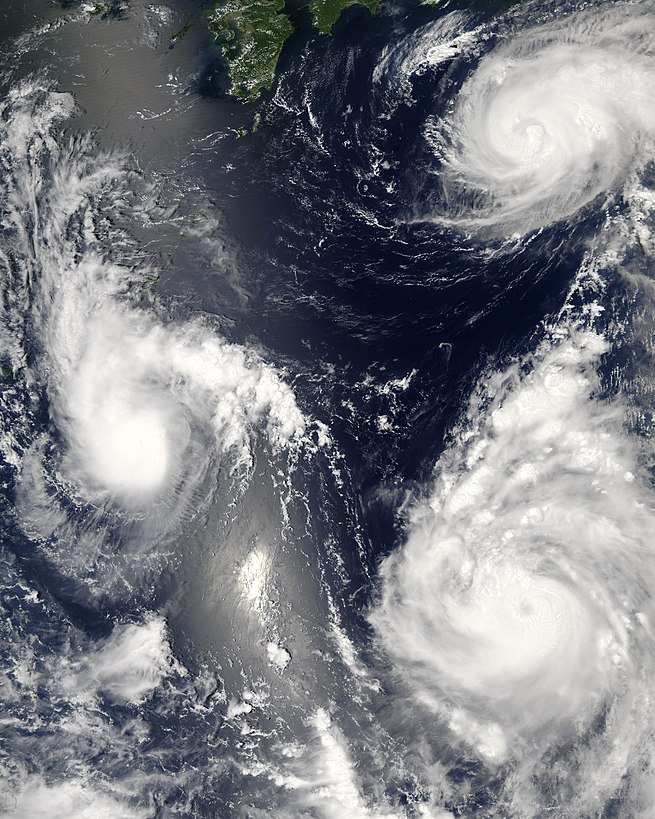Main Difference
The main difference between Typhoon and Monsoon is that the Typhoon is a type of tropical cyclone and Monsoon is a seasonal changes in atmospheric circulation and precipitation associated with the asymmetric heating of land and sea.
-
Typhoon
A typhoon is a mature tropical cyclone that develops between 180° and 100°E in the Northern Hemisphere. This region is referred to as the Northwestern Pacific Basin, and is the most active tropical cyclone basin on Earth, accounting for almost one-third of the world’s annual tropical cyclones. For organizational purposes, the northern Pacific Ocean is divided into three regions: the eastern (North America to 140°W), central (140° to 180°W), and western (180° to 100°E). The Regional Specialized Meteorological Center (RSMC) for tropical cyclone forecasts is in Japan, with other tropical cyclone warning centers for the northwest Pacific in Hawaii (the Joint Typhoon Warning Center), the Philippines and Hong Kong. While the RSMC names each system, the main name list itself is coordinated among 18 countries that have territories threatened by typhoons each year. Only the Philippines use their own naming list for thesystems approaching the country.A typhoon differs from a cyclone or hurricane only on the basis of location. A hurricane is a storm that occurs in the Atlantic Ocean or northeastern Pacific Ocean, a typhoon occurs in the northwestern Pacific Ocean, and a tropical cyclone occurs in the south Pacific or Indian Ocean.Within the northwestern Pacific there are no official typhoon seasons as tropical cyclones form throughout the year. Like any tropical cyclone, there are six main requirements for typhoon formation and development: sufficiently warm sea surface temperatures, atmospheric instability, high humidity in the lower to middle levels of the troposphere, enough Coriolis force to develop a low pressure center, a pre-existing low level focus or disturbance, and low vertical wind shear. While the majority of storms form between June and November, a few storms do occur between December and May (although tropical cyclone formation is at a minimum during that time). On average, the northwestern Pacific features the most numerous and intense tropical cyclones globally. Like other basins, they are steered by the subtropical ridge towards the west or northwest, with some systems recurving near and east of Japan. The Philippines receive the brunt of the landfalls, with China and Japan being impacted slightly less. Some of the deadliest typhoons in history have struck China. Southern China has the longest record of typhoon impacts for the region, with a thousand-year sample via documents within their archives. Taiwan has received the wettest known typhoon on record for the northwest Pacific tropical cyclone basins.
-
Monsoon
Monsoon () is traditionally defined as a seasonal reversing wind accompanied by corresponding changes in precipitation, but is now used to describe seasonal changes in atmospheric circulation and precipitation associated with the asymmetric heating of land and sea. Usually, the term monsoon is used to refer to the rainy phase of a seasonally changing pattern, although technically there is also a dry phase. The term is sometimes incorrectly used for locally heavy but short-term rains, although these rains meet the dictionary definition of monsoon.The major monsoon systems of the world consist of the West African and Asia-Australian monsoons. The inclusion of the North and South American monsoons with incomplete wind reversal has been debated.The term was first used in English in British India and neighbouring countries to refer to the big seasonal winds blowing from the Bay of Bengal and Arabian Sea in the southwest bringing heavy rainfall to the area.
-
Typhoon (noun)
A knots (118km/h) or above. Equivalent to a cyclone in the Indian Ocean and Indonesia/Australia.
-
Typhoon (verb)
To swirl like a hurricane.
-
Monsoon (noun)
Any of a number of winds associated with regions where most rain falls during a particular season.
-
Monsoon (noun)
Tropical rainy season when the rain lasts for several months with few interruptions.
-
Monsoon (noun)
The rains themselves.
-
Monsoon (noun)
Entire meteorological systems with such characteristics.

